Irish Changeling in New York February 18, 2012
Author: Beach Combing | in : Modern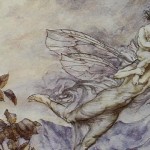
Ok there has been a lot of energy and desperation spent on this one: Beach has wasted, in fact, about six hours of his life trying to chase down the story. If any reader should happen to find a newspaper version there will be a bright shiny book of some description put in the post […]
The Valley of Elves, Nymphs, Cars, Swans or Whatever February 11, 2012
Author: Beach Combing | in : Medieval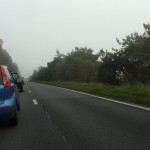
The elves were Anglo-Saxon fairies and as such deserve a bizarrist’s respect. They are though – not unlike the medieval fairies that come after – gone almost without trace. But there is, every so often, a Dark Age charm, a riddle, a line of Anglo-Saxon poetry that recalls belief in this receding people. Make no […]
Fairies and Golf Balls February 8, 2012
Author: Beach Combing | in : Modern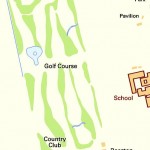
Beachcombing had a melancholy moment this morning. He turned up a report from the mid nineteenth-century (a letter) of a forgotten bit of fairylore from the county of Leicestershire: a county (for those in less happy lands) in the English Midlands. In the lordship of Humberston, on the estate of Mr. Poohin [try looking for […]
What Religion did Fairies Follow? January 22, 2012
Author: Beach Combing | in : Ancient, Modern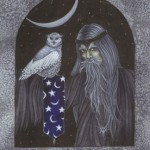
Beach’s endless reading in the literature of fairies has led him to a couple of unusual passages. He honestly doesn’t know that to make of them. In truth, they frighten him. The first is from a south-western fairy tale where a man is reunited with his ‘dead’ fiancé who is actually trapped in fairy land. […]
Outlaws on Ice January 10, 2012
Author: Beach Combing | in : Modern
Beachcombing has just, through extraordinary and characteristic, incompetence lost a week of his life. He thought that he began teaching the 23 Jan, when, instead, it seems that he is to start on the 16. He now has two days to write three academic articles. Given this emergency situation he was planning (ha!) to type […]
Epiphany Gift to Readers: Scary Fairies PDF January 6, 2012
Author: Beach Combing | in : Contemporary, Modern
Scary Fairies… While Barrie, Nesbit and others were trying to anodize* and castrate fairies c. 1900 out in the wilds of Britain, Man and Ireland there will still those who were terrified of the elfen beggars. This terror finds a little known reflex in the literature of the time. Various authors including Buchan, Machen, Le […]
Snakes, Fairies and St Patrick January 5, 2012
Author: Beach Combing | in : Medieval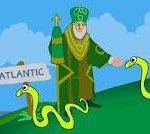
A lead up to tomorrow’s epiphany gift to all readers: Scary Fairies: the Proto Edition. Bede begins his Ecclesiastical History of the English in 731 with a geographical overview of the island of Britain and also, given its importance in the conversion of the English to Christianity, Ireland. It is a memorable passage not least […]
What do fairies smell of? December 23, 2011
Author: Beach Combing | in : ModernBeachcombing knows that not everyone appreciates his endless posts on fairies, but here is – he promises – the last one for 2011. He might even wait a week before he starts again in 2012. Anyway, apologies apart, he recently stumbled on a rather beautiful book about Yorkshire in the late nineteenth century, one that […]
Jung, Active Imagination and the Bicameral Mind December 18, 2011
Author: Beach Combing | in : Actualite, ContemporaryThe demography of this blog is unusual: it is about 30% history buffs, 30% anomalists/Forteans and 40% hybrid types. Beachcombing belongs very much to the first of these three and he certainly did not plan, when he started, a year and a half ago, to write for anyone but his dry-as-dust friends. He is glad, […]
Fairy Death Bed Conversion December 15, 2011
Author: Beach Combing | in : ModernBeachcombing’s fairy year continues. In his grazing through the accounts of the fairy faith on the western and northern fringe of Europe one of the things that has most fascinated him is the belief of the connection between Catholicism and things fairy. There is a famous early modern comment – irritatingly Beach can’t remember by […]
Case of the Cottingley Fairies December 2, 2011
Author: Beach Combing | in : ContemporaryJoe Cooper, The Cottingley Fairies, 1990. The story is a simple one. In the First World War a young girl named Frances Griffith saw fairies at the brook where she played in the Yorkshire village of Cottingley. In 1917 she and her older friend Elsie Wright were stung by their parents’ refusal to believe Frances. […]
Haunted Chessmen November 25, 2011
Author: Beach Combing | in : Contemporary, Medieval, Modern
Invisible writes in with the news that the Lewis Chessmen are about to go on exhibition in New York. And Beach took this as a prompt for one of his favourite archaeological stories. The unnamed Lewis farmer in the following account was one Malcolm ‘Sprot’ Macleod In 1831 a high tide on the coast […]
A Dark Age British Sasquatch? November 18, 2011
Author: Beach Combing | in : Medieval*** This post is dedicated to Adrian S *** One epic poem survives from Anglo-Saxon England: Beowulf. Beowulf, for those who do not know, was a Danish hero who, in the course of said poem fights three monsters: first Grendel, second Grendel’s mother and third a dragon who gets the better of him. Grendel particularly […]
Fairy Investigation Society November 14, 2011
Author: Beach Combing | in : Contemporary***This post is dedicated to Invisible*** Beachcombing has a bit of a chip on his shoulder about Wikipedia. But every so often there are pages there that are the closest we come to ‘real knowledge’. Take the Fairy Investigation Society that Beach has been looking into for the last couple of days – since, in […]
Review: The Middle Kingdom November 8, 2011
Author: Beach Combing | in : Contemporary, ModernAs regular readers will know Beachcombing went a little fairy mad this summer. Indeed, as we speak two academic articles have been accepted for publication and four more are still waiting the judgement of tetchy referees spread out from Edinburgh to the Pacific Coast. In the process of writing these articles he read most twentieth-century […]


